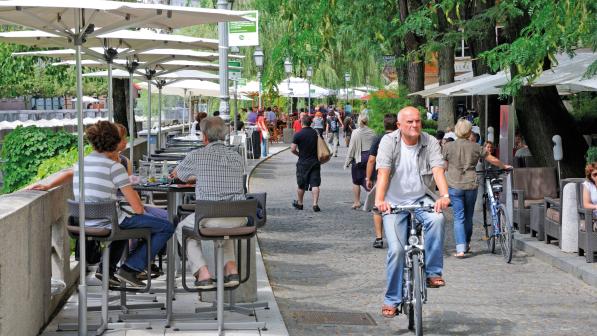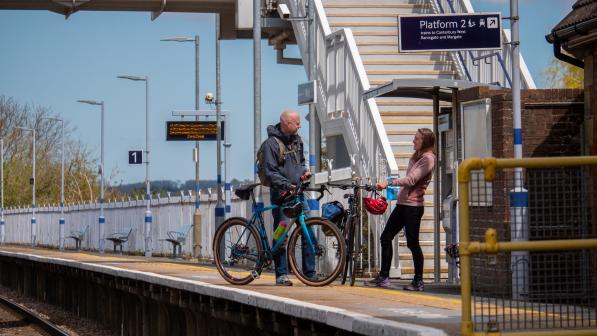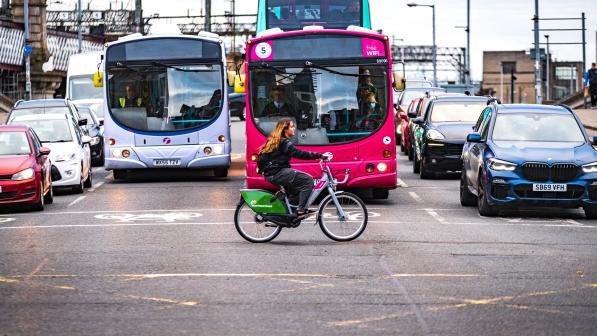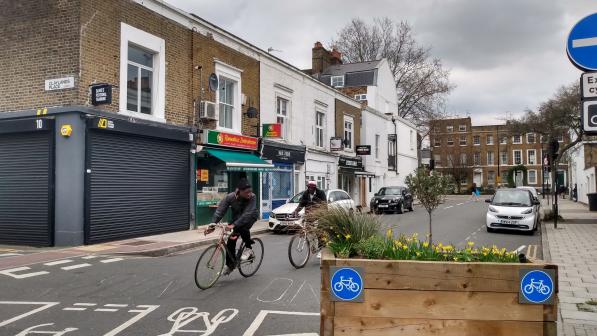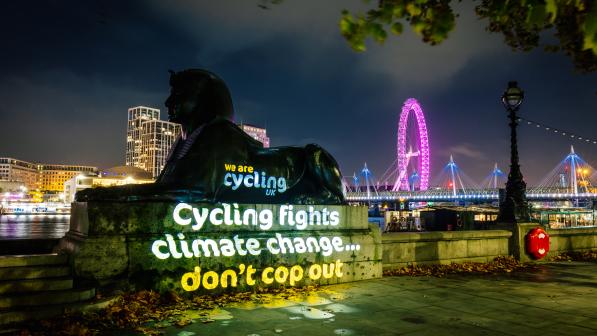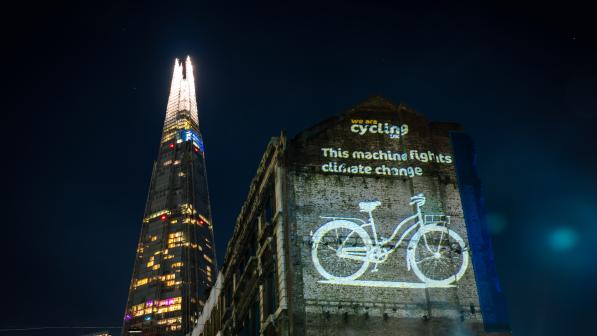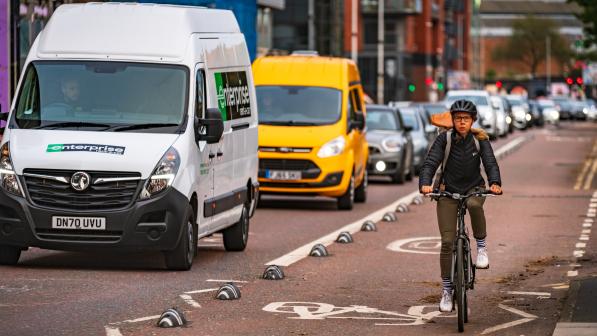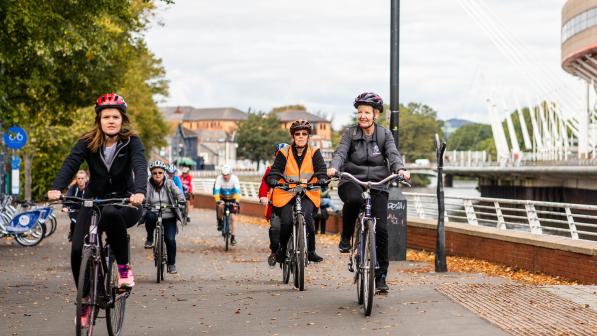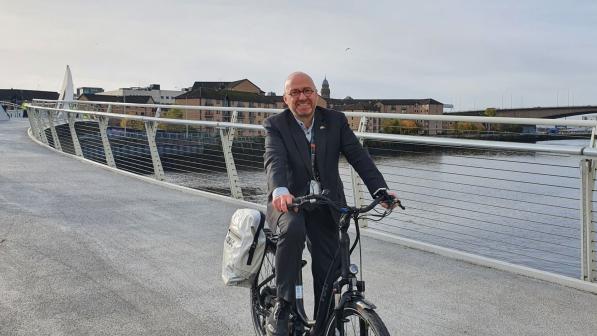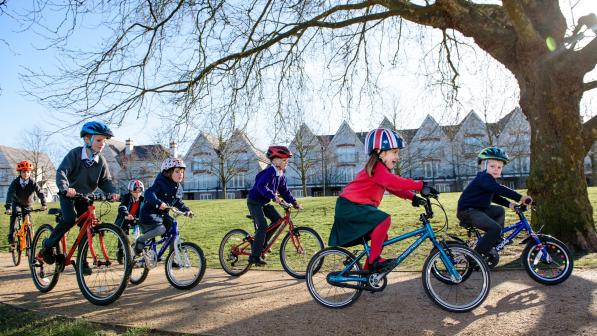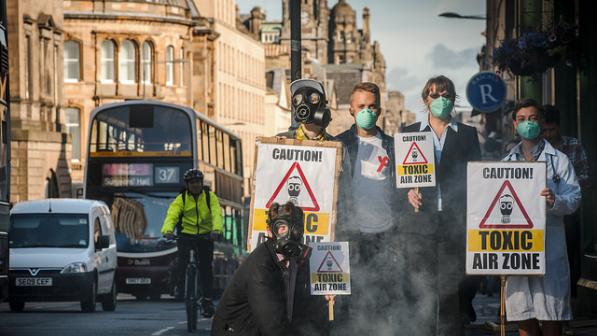Drive less, cycle more – taking the challenge to government

Drive less, cycle more is an easy concept but a tricky challenge for individuals and society. It’s not easy for any of us who own a car to shift our travel habits, choosing to leave the car at home and jumping on a bike instead.
However, driving less and cycling more is challenge society must grasp if we are to make our neighbourhoods cleaner, safer and more attractive places to live, work and play.
In a previous job I regularly commuted by bike to an office in Glasgow’s West End. This was mostly an easy journey, plus it was cheaper and quicker than driving.
However, my route took me along feeder roads beside the M8 motorway, close to the centre of the city where the sheer amount of traffic jostling for space was scary. On certain days I could taste the pollution hanging in the air above the motorway. I would cycle past St Patrick’s RC Primary School which overlooks the M8 and wonder at the damage the motorway smog was doing to young lungs.
In 2013, nine-year-old Ella Kissi-Debrah died after an acute asthma attack in south London. She is the first person in the world to have air pollution listed as a cause of death.
The traffic pandemic
Our roads are too often choked with cars, vans and trucks and the fumes they produce, leading to dirty air and contributing to climate change. Sadly in many places congestion and air quality are getting worse, with no likelihood of a reversal, especially as the UK Department for Transport predicts motorised traffic will increase by up to 54% in the years between 2025 and 2060.
Transport is the sector which causes the most climate emissions in the UK. Decarbonising transport is key to meeting our climate targets.
The UK Government has plans to phase out the sale of fossil fuel vehicles by 2030, which is a welcome policy and will encourage the switch to electric vehicles.
Switching our fossil fuel vehicles to electric versions will cut noxious exhaust fumes and help us reach climate targets – but it won’t solve congestion, road capacity and parking problems. We need fewer cars on the road not just newer electric cars.
At the COP26 climate conference in Glasgow in 2021 we criticised the UK presidency because of its sole focus on e-vehicles as the solution rather than promoting cycling and low-carbon alternatives to making transport more sustainable.
It’s time that governments acted to rebalance our transport system and offer people a real alternative to driving. Put simply, government must reduce society’s dependence on the car
Jim Densham, Cycling UK’s campaigns and policy manager
Rebalancing transport
This week is Better Transport Week, run by our friends at the Campaign for Better Transport.
We are using the opportunity to promote our Drive less, cycle more message and explain why Cycling UK is calling on governments in the UK to make driving a less attractive option, in addition to making cycling an easy choice. It’s time that governments acted to rebalance our transport system and offer people a real alternative to driving. Put simply, government must reduce society’s dependence on the car.
Cycling UK’s mission is to enable millions more people to cycle and experience the benefits of riding a bike. However, we know that while creating more cycle lanes and cycling infrastructure is a good thing, it won’t be enough to achieve our goal.
For example, in a regular survey in Scotland people consistently say that an important motivation for cycling is more safe cycling infrastructure: 75% expressed this in 2022. But people also say they want ‘less/slower traffic on the road’ – 66% in 2022.
Remember the first days of the Covid lockdown in 2020 and how the streets were quieter and this gave people the space and confidence to walk and cycle? Quiet roads with slow traffic are more welcoming and pleasurable places to be on a bike – they are safer and, importantly, they feel safer too.
Reducing motor traffic isn’t just a congestion, climate and air quality issue, its also a cycling issue – which is why Cycling UK is concerned and talking about it.

The example of Glasgow
My city of Glasgow demonstrates well the problem society faces in reducing motor traffic – but also the way local governments can employ solutions and make changes.
Glasgow is a relatively young city with neighbourhoods designed around car use. This is despite Glasgow historically having relatively low levels of car ownership: currently only 45% of households have access to a car or van.
The greatest example of the impact of the car on Glasgow came in the 1960s when parts of the city were levelled to make way for the M8 which carved the city in half. I’ve already described the impact that decision had on air quality and the enjoyment of cycling across the city.
The M8’s construction and the city centre’s wide roads and limited pedestrianisation has meant driving into town became the norm. Modern Glasgow has been built around the motor vehicle and as a consequence is home to Scotland’s most polluted street.
Thankfully, things are set to change as the City Council aims to meet targets to become carbon neutral and to reduce car journeys by 30% by 2030.
Glasgow has a plan to construct 270km of high-quality cycleways and improved footways along main roads which will create a meaningful active travel network across the city. It is also introducing measures to make car journeys a less attractive option in the city centre, such as bus gates to prevent cars entering the city centre at specific points, and a new Low Emission Zone.
Added to more pedestrianisation planned for the future, these measures and others should make Glasgow a cleaner, quieter and more pleasant place to walk, cycle and live in.
Glasgow has made a start to its transition, while the Scottish Government’s commitment for a 20% reduction in car journey kilometres by 2030 will provide the impetus to spread action right across the nation. But all national and local governments in the UK have to do more to rebalance their transport systems and must learn from each other.
There are many positive efforts being made around the UK; for example, Nottingham’s Workplace Parking Levy, the proceeds of which are used to pay for public transport and active travel improvements, and the Welsh Government’s Roads Review process which has put a halt to unchecked road building.

Be part of the solution
Cycling UK doesn’t want a war on the motorist, and neither are we blaming individual drivers. Like many cyclists I’m also a car owner and driver, and as such I’m also part of the problem. I know how easy it is to simply reach for the car keys when I need to get out and about.
But like many others, I want to be part of the solution – I want to use my car less and eventually feel able to not own one.
To enable us all to reduce our car use we need our national and local governments to make cycling and walking safe and easy, bus and train travel affordable and available, and use of private vehicles a less attractive choice, especially in towns and cities where there can be better transport alternatives.
Cycling UK will be doing much more over the coming year to tell governments that reducing motor traffic is a necessary priority because it will enable and encourage more people to cycle. Creating safe cycle lanes is a great thing to do but it’s not enough – the time has come to wean society off its car dependency so we all have the opportunity to drive less and cycle more.
If you want to be part of the solution and speak up for cycling where you live you can get involved through our Cycle Advocacy Network (CAN).
Look out for more from our campaigns team on the challenge of motor traffic reduction and the solutions in coming months.
